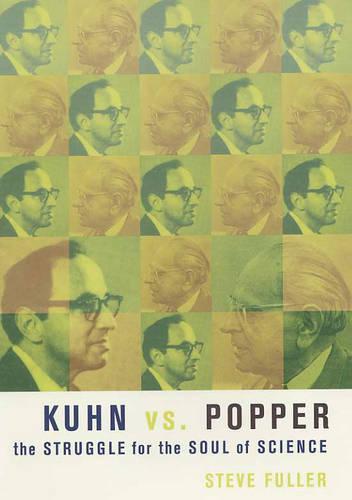Overview
Thomas Kuhn's Structure of Scientific Revolutions has sold over a million copies in more than twenty languages and has remained one of the ten most cited academic works for the past half century. In contrast, Karl Popper's seminal book The Logic of Scientific Discovery has lapsed into relative obscurity. Although the two men debated the nature of science only once, the legacy of this encounter has dominated intellectual and public discussions on the topic ever since. Almost universally recognized as the modern watershed in the philosophy of science, Kuhn's relativistic vision of shifting paradigms-which asserted that science was just another human activity, like art or philosophy, only more specialized-triumphed over Popper's more positivistic belief in science's revolutionary potential to falsify society's dogmas. But has this victory been beneficial for science? Steve Fuller argues that not only has Kuhn's dominance had an adverse impact on the field but both thinkers have been radically misinterpreted in the process. This debate raises a vital question: Can science remain an independent, progressive force in society, or is it destined to continue as the technical wing of the military-industrial complex? Drawing on original research-including the Kuhn archives at MIT-Fuller offers a clear account of ""Kuhn vs. Popper"" and what it will mean for the future of scientific inquiry.
Full Product Details
Author: Steve Fuller (University of Warwick)
Publisher: Columbia University Press
Imprint: Columbia University Press
Dimensions:
Width: 15.20cm
, Height: 1.50cm
, Length: 22.90cm
Weight: 0.312kg
ISBN: 9780231134286
ISBN 10: 0231134282
Pages: 160
Publication Date: 14 December 2004
Audience:
Professional and scholarly
,
Professional & Vocational
Format: Hardback
Publisher's Status: Active
Availability: Manufactured on demand

We will order this item for you from a manufactured on demand supplier.
Language: English
Reviews
This is an eloquently written book, offering new and interesting perspectives on the moral and social ramifications of this debate. -- Ray Percival, New Scientist A succinct yet in-depth inquiry into a significant philosophical issue. -- Kirkus It's a fascinating and, at 132 pages, delightfully concise work. -- Gregory Mone, Popular Science A feisty and rich little book...always stimulating -- A. C. Grayling, Financial Times This slight volume is a lively, incisive volume...This volume will be of great interest both to academic specialists and general readers...Recommended. -- Choice Kuhn vs. Popper is a concise and engaging book that philosophers of science, investigators of political thought and, indeed, laymen with a philosophical interest will find an interesting read. -- Milja Kurki, History of Political Thought Provocative and brilliant. -- Neil McLaughlin, Canadian Journal of Sociology Online A provocative read. -- Robert J. Deltete, Philosophy In Review
An overview of the debate between the two most influential modern philosophies of science. Fuller (Sociology/Univ. of Warwick) places Thomas Kuhn (1922-96) and Karl Popper (1902-94) at the heads of two divergent schools of thought about the roles of science and the scientist. Kuhn's 1960 book, The Structure of Scientific Revolutions, postulated that scientists normally work within a paradigm, a framework of ideas that controls what questions they ask and what data they examine. At intervals, a new paradigm-for example, the Copernican solar system-captures the imagination of a new generation of scientists and replaces the old one, without necessarily being a more accurate depiction of reality. Popper, an intellectual descendent of the logical positivist school, argued that the essence of science is the search for ways to falsify accepted viewpoints, and that only those propositions that can be disproved are genuinely scientific. Fuller states the two men's basic positions and examines their underlying scientific, historical, and political premises. Openly acknowledging that he finds Kuhn's theory detrimental to the independence of science, the author suggests that because Kuhn came to intellectual maturity in an era when American society needed to subsume scientific research into the Cold War effort, he favored a view in which most scientists do not ordinarily question basic principles. Popper's view, that science is a model of an open society in which free inquiry is the norm, offers at the same time more personal freedom and more personal responsibility to the individual scientist. While the general verdict is that Kuhn won the debate during the two men's lifetimes, Fuller argues that Popper's view retains the potential to liberate science from its current role as the handmaiden of government and business. A succinct yet in-depth inquiry into a significant philosophical issue. (Kirkus Reviews)
Author Information
Steve Fuller is professor of sociology at the University of Warwick, England, and the author of Thomas Kuhn: A Philosophical History for Our Times.



